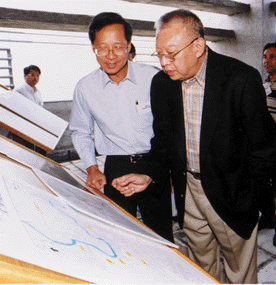COVER STORYSpin doctors healPublic relations consultants design images for politiciansBy Christine Au Politics is never a one-man show. Behind a politicians’ eloquent speeches and easy manner in front of the TV crews, many people are actually at work. In order to generate public support for their political positions, politicians resort to public relations. Public relations professionals who work for politicians are known as “spin doctors” in the United States. Said Mr. Lo Chi Kin, a public affairs consultant: “Public relations is a unique type of communication in which the public interest is involved. “It ranges from strategic planning to what is finally presented to the public.” He said, “Rather than undergoing a rational analysis, people subjectively decide who is doing good things for them. This is the reason why public relations came into being.” However, it is wrong to make use of public relations only after a decision is made or a programme announced. Ms Anne Forrest is the managing director of the Forrest International, a public relations consultancy. Said she: “Public relations is to mould and help shape public opinion so that by the time the government makes a decision, people would have understood why the decision is made, even though they may not like it.”
Community visits increase the connection with the public.Recently the importance of public relations in local politics has increased. Mr. Andy Ho On Dai, managing director of PA Professional Consultants Limited, explained this phenomenon. “(Former Governor) Chris Patten brought about openness and accountability to the government,” said he. “Bureaucrats realized that they will bear a higher administration cost if they go astray from public sentiment. “Moreover, the coming direct election motivates political figures and groups to increase their exposure to the public, with an aim to gain more publicity,” he said. Nevertheless, it should not be mistaken that public relations is a remedy for wrongdoings. Mr. Ho said, “No matter how you package it, a decayed apple is still rotten in nature.” Ms Marian Leung Kit Ngor is the managing director of the Communications Training Practice Department of the Asia Pacific branch of Burson-Marsteller. “Public relations is not meant to teach people how to lie or deceive. It can position policies in a way that majority of the people find them acceptable,” she said. “‘Good policies make good press. Communication can help only if the policy itself is justifiable.” ‘By remaining absolutely silent, the government will lose more marks than by saying something wrong.’In order to attain a favourable public image, Mr. Lo said public figures have to focus on one particular issue. He said, “Most people do not rank politics as their prime concern. Therefore, it is not easy for politicians to convey their messages efficiently in such a cramped political arena. “Public figures have to grasp every opportunity to increase their own value while retaining a low profile in times of possible downfall of popularity.” Mr. Ho said, “Public figures should not depend on (PR) consultants. Rather, they should focus on themselves and see what specific goal they are aiming to achieve. It is not advisable for politicians to make frequent compromises so as to ingratiate themselves with the public.” Compared with the West, the SAR government pays less attention to public relations. Mr. Lo explained, “Democracy was introduced to Hong Kong not long ago. Thus, the government has not had a consolidated tradition of being responsible to the public.” Ms Forrest said, “The SAR government does not understand the whole thing of moulding public opinion in order to get a consensus.” Government officials, according to Ms Forrest, tend to make a decision behind closed doors and tell people what they have done and why they did it, expecting unquestioned acceptance. Said Ms Forrest: “However, given the education level and availability of information in Hong Kong, this is impractical. The public is now demanding more say in advance of the decision being made.” “In times of crises,” said Mr. Lo, “if the public expect feedback from the government, leaders ought to say something. By remaining absolutely silent, the government will lose more marks than by saying something wrong.” Before the hand-over, Burson-Marstel-ler was employed by Chief Executive Tung Chee-hwa to provide public relations advice. Ms Leung was on the team. Said she: “Before the election, our aim, obviously, was to enable Mr. Tung to be elected. Although only 400 people had the right to vote, we tried to make the event a public business.” She said the Chief Executive could not gain legitimacy as a leader without citizen support. “Now, we have to help prepare the setting-up of the new administration, including the selection of Executive Council members,” Ms Leung said. At present, public relations advice to the Chief Executive is provided in-house by the Press Office with support from government bureaus and, in particular, Government Information Services Department, according to a spokesperson for the Chief Executive. Ms Forrest drew an analogy between Mr. Tung and American President Bill Clinton. “During his first year in office, President Clinton made a lot of terrible mistakes. He kept changing directions, but he finally found people experienced and capable enough to back him up. “In order to improve, Mr. Tung can try to have more direct communication with the public. In fact, the whole government should open up to the public.” |
